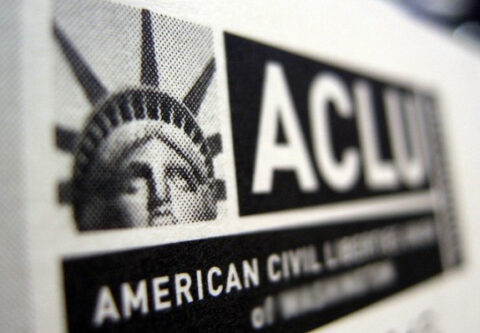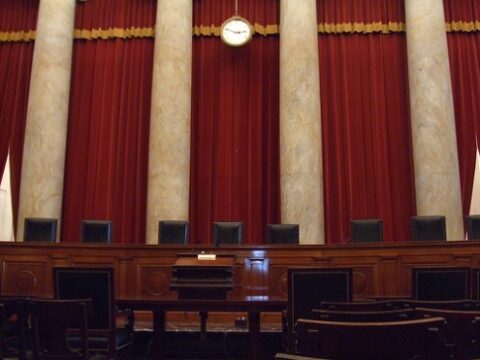Due Process and the Courts

CIS Report Marred by ‘Deception and Disorder’
By Anam Rahman In a report issued earlier today, the restrictionist Center for Immigration Studies (CIS) took aim at problems facing the U.S. immigration court system—a topic worthy of serious discussion. Unfortunately, as with many of CIS’ publications, today’s report combines dramatic rhetoric and unsubstantiated data with ill-conceived solutions. While it is unlikely the report will gain traction in Congress or the media, a few of its—and its author’s—shortcomings remain worth pointing out. Read More

Immigration Court Backlog Likely to Get Worse Before It Gets Better
Our nation’s immigration courts are backlogged. Historically backlogged. At the end of last year, more than 260,000 cases remained pending before immigration judges. Across the country, the average wait was nearly sixteen months. In California, thousands of cases have been pending for more than two years. While justice is not always swift, our immigration courts are getting increasingly further from the finish line. Read More

Another Study Highlights Need for Legal Representation in Immigration Court
Findings released last week by the New York Immigration Representation Study reveal what immigration advocates long have said: whether a person has legal representation is a critical factor in obtaining a favorable result in immigration court. The findings—which are based on a study of individuals apprehended in New York from October 2005 through December 2010—show that amongst noncitizens who are not in detention, 74 percent of those with lawyers obtained favorable outcomes, versus only 13 percent of those without lawyers. Amongst noncitizens in detention, 18 percent of those represented by attorneys obtained favorable outcomes in immigration court, versus only 3 percent of those who lacked representation. Read More

ACLU Files Lawsuit Against Utah’s Immigration Enforcement Law
Today, the American Civil Liberties Union (ACLU), National Immigration Law Center (NILC), and the law firm of Munger, Tolles & Olsen filed a class action lawsuit against Utah’s HB 497— an SB1070-inspired immigration-enforcement bill. Last March, Utah passed three distinct immigration bills that collectively were designed to go beyond the enforcement-only approach of Arizona’s SB1070 through the addition of state-based guest worker programs. Those programs, however, do not go into effect until a host of other conditions are met, leaving the enforcement provisions of HB 497 as the only part of the Utah plan with any teeth. Set to go into effect on May 10, HB 497 presents many of the same Constitutional challenges as SB 1070, thus making a court challenge inevitable. Read More

Four Cheers for the Ninth Circuit’s Ruling on SB 1070
In a clean sweep for the rule of law, the U.S. Court of Appeals for the Ninth Circuit upheld a preliminary injunction yesterday against four key provisions of SB 1070—Arizona’s notoriously misguided attempt to drive undocumented immigrants from the state. The court’s comprehensive ruling left in place a lower court decision from July which temporarily blocked much of the measure from going into effect. Though the future of the case is far from settled, the upshot of the decision is clear: the federal government, and the federal government alone, sets the terms for enforcing federal immigration law. Read More

Despite Limits, How Padilla v. Kentucky Will Endure
Retired Supreme Court Justice John Paul Stevens, author of the Padilla v. Kentucky opinion. Immigrant advocates rejoiced last spring when the Supreme Court made clear in Padilla v. Kentucky that criminal defense lawyers must inform noncitizen clients if pleading guilty to a particular crime could result in their deportation. Since then, the Court’s ruling has provided much-needed relief for many immigrants whose lawyers failed to properly advise them. At the same time, however, the immigrants’ rights community is realizing that the decision has its limits and will not help all noncitizens whose lawyers failed to give such advice in the past. Read More

Despite Limits, How Padilla v. Kentucky Will Endure
Retired Supreme Court Justice John Paul Stevens, author of the Padilla v. Kentucky opinion. Immigrant advocates rejoiced last spring when the Supreme Court made clear in Padilla v. Kentucky that criminal defense lawyers must inform noncitizen clients if pleading guilty to a particular crime could result in their deportation. Since then, the Court’s ruling has provided much-needed relief for many immigrants whose lawyers failed to properly advise them. At the same time, however, the immigrants’ rights community is realizing that the decision has its limits and will not help all noncitizens whose lawyers failed to give such advice in the past. Read More

A One-Man Wrecking Crew: New Report Details the Costly Career of Kris Kobach
It is hardly surprising that the newly elected Kansas secretary of state, Kris Kobach, ran an election campaign which featured the baseless claim that “the illegal registration of alien voters has become pervasive” in the state. As a new report from the Southern Poverty Law Center (SPLC) describes in detail, Kobach has built a long and varied career out of attacking immigrants; first in the Bush Administration, targeting legal immigrants from Muslim and Arab countries, and later as the architect of city ordinances and state laws targeting unauthorized, mostly Latino immigrants. Yet, while Kobach’s anti-immigrant initiatives have served to advance him politically and financially, virtually all of them have ended up being costly failures for which taxpayers ultimately foot the bill. Read More

Win, Lose or….Draw? The Supreme Court Tackles Arizona’s Employer Sanctions Law
Those following the Obama Administration’s legal challenge to Arizona’s SB 1070 have likely heard about “preemption”—the legal concept governing when state laws conflict with, and are therefore superseded by, acts of Congress. The heart of the dispute over SB 1070 is whether states have a right to provide assistance that the federal government does not want. No one knows if or how the Supreme Court will ultimately answer that question. But a number of hints may emerge when the Justices issue a ruling in Chamber of Commerce v. Whiting, a case testing the legality of a different law known as the Legal Arizona Workers Act. Passed in 2007, the act imposed new requirements to prevent employers from hiring unauthorized workers, as well as harsh consequences for doing so. While the Justices’ questions during Wednesday’s oral argument offered reason for hope among immigrants’ rights advocates on one part of the law, they left the fate of the other unresolved. Read More

Kafka Revisited: Ninth Circuit Decision Protects Due Process Rights for Noncitizens
The basic tenet that you can’t be sued without knowing the charges against you and having a meaningful opportunity to defend yourself is a cornerstone of the U.S. judicial system. This concept of fundamental fairness ensures that people in courtrooms across the country have access to a discovery process that enables them to see the other side’s evidence. Plaintiffs and prosecutors are routinely required to produce documents that will be used to prove their cases so that defendants have a chance to respond. For too long, however, these kinds of procedures and protections have been denied to noncitizens in immigration court. Read More
Make a contribution
Make a direct impact on the lives of immigrants.
